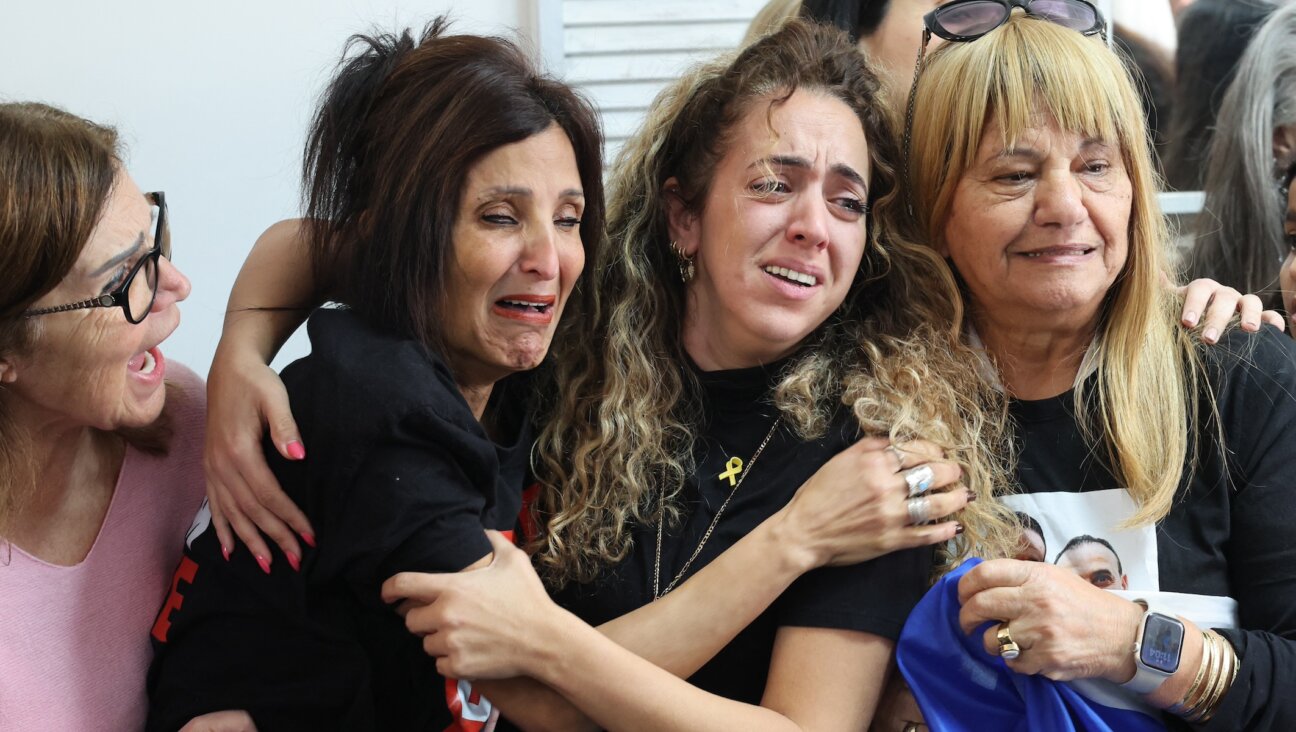N.Y. Okays Public School With Hebrew Focus
The movement for publicly funded Hebrew language and culture charter schools took a giant step forward as a new charter school for New York City received final approval and plans emerged for a national center to back Hebrew charter school efforts across the country.
On January 13, the New York State Board of Regents approved the application for the Hebrew Language Academy Charter School, a school that would teach the Hebrew language and aspects of Jewish culture, largely with public funds. Michael Steinhardt, a former hedge fund manager who has championed a number of high-profile Jewish causes, funded the application. Sara Berman, Steinhardt’s daughter and a former editor at this newspaper, was the lead applicant.
Hebrew charter schools have become a hot item in the world of Jewish identity and education, but it is difficult to tell what the latest development will augur. By law, the school must be open to all applicants and be devoid of religious content. Berman has insisted that the school will welcome children from every background, and that its priority is to teach Hebrew to anyone who is interested rather than to instill Jews with a Jewish identity.
“This vote today affirms our belief that learning modern Hebrew, like many of the other vibrant languages and cultures being taught in New York’s public schools, can help prepare students of all backgrounds to succeed in today’s world,” Berman said in a statement released promptly after the school was approved. “The same is true for the values of cultural diversity, community responsibility, and respect for others that will pervade this school.”
But Steinhardt has spoken publicly about using a national network of Hebrew charter schools to instill Jewish identity without the private expense of Jewish day schools.
In fact, Steinhardt has made significant progress in that direction, and the Brooklyn school, scheduled to open in the fall of 2009, may be only the first step. The Forward has learned that a Steinhardt-led group of philanthropists is putting together plans to create a national support center to assist local groups that want to put together applications for Hebrew charter schools in their own communities.
The group, called Areivim, consists of 15 multi-millionaires (out of a projected total of 20) who have each pledged $5 million to support the mission of promoting Jewish education and identity. Steinhardt is co-chair, along with Detroit philanthropist William Davidson. Sources close to the organization, speaking on condition of anonymity to preserve Areivim’s low profile, said that although plans had not yet been finalized, it was expected that the center would offer grants and technical expertise to the local groups.
The prospect of a new Hebrew language charter school in New York City, home to the nation’s largest concentrations of Jews and national media outlets, combined with the prospect of a support system for new schools, represent a major leap for the Hebrew charter school movement. But some Hebrew charter school boosters are taking a wait-and-see approach.
“I’m very excited about it. I think it’s fantastic,” said Peter Deutsch, founder of the Ben Gamla Charter School, the country’s first Hebrew charter school, which opened in the fall of 2007 in Hollywood, Fla. But, Deutsch added, “What’s the purpose going to be? Is the purpose going to be to educate gentiles about the Hebrew language, or is it going to be to educate Jews about Jewish history and Jewish culture and Jewish language?” Deutsch favors the latter.
The news may also bring a sharper edge to ongoing debates in the Jewish community about the wisdom and efficacy of Hebrew language charter schools. Critics have variously argued that Hebrew language charter schools impermissibly erode church-state boundaries, potentially balkanize Jews from the rest of society, and create a false dichotomy between Jewish religion and culture.
“The idea here is to strengthen Jewish identity, but you can’t do it in an open way because you run afoul of the law,” said Rabbi Eric Yoffie, president of the Union for Reform Judaism and a critic of Hebrew charter schools. “So you end up having rabbis and Jewish educators involved, and in all probability promoting Jewish commitment is exactly what they are looking to do, but they can’t do it openly. It simply will not work.”
Yoffie said the idea would not even work on its own terms to promote Jewish identity. “There’s absolutely nothing in 4,000 years of experience to suggest you can separate out religion and culture and simply teach culture to the exclusion of religion,” he said. “Those two pillars are inextricably intertwined.”
An irony in the approval of the Hebrew Language Academy is that it will open in the same borough as the Khalil Gibran International Academy, a public school (though not a charter school) dedicated to Arabic language and culture that ignited a firestorm of controversy in early 2007 when it was first proposed. Though some criticized the notion of the Gibran Academy on the grounds that it would balkanize the public school system, the loudest protests were from critics — many of them Jewish — who warned that the school would indoctrinate students into radical Islamist ideology. One of the most prominent venues of criticism was the Steinhardt-backed New York Sun newspaper.
The controversy raged for months and eventually culminated in the school’s principal, Debbie Almontaser, resigning in August of 2007 before the school opened. Almontaser has since sued New York City for infringing her right to free speech, and the school has reportedly foundered since opening.
So far, the Hebrew charter school has not been similarly inflammatory. Those who have criticized the school have done so on policy grounds.
For example, Saul Cohen, the lone member of the Board of Regents’s charter school committee to vote against the application, said that his main concern was that the school was not efficaciously organized to help the largely minority students of the school district where it would be located. The district does include a number of Russian Jewish and Israeli immigrants, as well as Orthodox Jews, but they constitute a small minority of the district’s public school students.
Cohen, who is himself Jewish, argued that the Hebrew language program wouldn’t be of much assistance to the district’s students in learning English and would not reflect the ethnic composition of the surrounding district.
If anything, the application for the Hebrew Language Academy demonstrates the power that a wealthy, politically savvy backer like Steinhardt can infuse into the movement. Charter school applications are typically long, cumbersome and technically complex, which may account for the fact that despite widespread interest in the concept since the 2007 launching of the school in Florida, no other efforts beside Steinhardt’s have yet gotten off the ground.
The Steinhardt application was assembled by an expert team of consultants. Another consultant handled media and political relations, and the team carefully cultivated community support. Education officials praised the application for its high quality and rich curriculum.
At roughly the same time that the Steinhardt group submitted its application, a similar application for a Hebrew charter school was submitted in Englewood, N.J., by Raphael Bachrach, a printing consultant and local school parent. Bachrach said he and his wife did most of the work on the application themselves.
“I can’t even clarify in my mind how much work we put into it. A lot of late nights,” Bachrach told the Forward. “We didn’t have any funding from anybody to work with, or really any support, initially, from anybody except for Peter Deutsch down in Florida, which was more moral support and ideas.”
Bachrach’s application ultimately wasn’t approved, and though he doesn’t know exactly why the application was rejected — he suspects people were wary of church-state issues — he concedes that he struggled with the technical aspects.
When told about Areivim’s initiative to create a national support system for charter school applicants like himself, Bachrach was impressed.
“Having a group that has funding and a mission of getting [Hebrew charter schools] started would be great,” he said. “I hope they call me and ask me if we need their help.”
The Forward is free to read, but it isn’t free to produce

I hope you appreciated this article. Before you go, I’d like to ask you to please support the Forward.
Now more than ever, American Jews need independent news they can trust, with reporting driven by truth, not ideology. We serve you, not any ideological agenda.
At a time when other newsrooms are closing or cutting back, the Forward has removed its paywall and invested additional resources to report on the ground from Israel and around the U.S. on the impact of the war, rising antisemitism and polarized discourse.
This is a great time to support independent Jewish journalism you rely on. Make a gift today!
— Rachel Fishman Feddersen, Publisher and CEO
Support our mission to tell the Jewish story fully and fairly.
Most Popular
- 1

Fast Forward Ye debuts ‘Heil Hitler’ music video that includes a sample of a Hitler speech
- 2

Culture Cardinals are Catholic, not Jewish — so why do they all wear yarmulkes?
- 3

Opinion It looks like Israel totally underestimated Trump
- 4

Fast Forward Student suspended for ‘F— the Jews’ video defends himself on antisemitic podcast
In Case You Missed It
-

Opinion It looks like Israel totally underestimated Trump
-

Fast Forward Betar ‘almost exclusively triggered’ UMass student detention, judge says
-

Fast Forward ‘Honey, he’s had enough of you’: Trump’s Middle East moves increasingly appear to sideline Israel
-

Fast Forward Yeshiva University rescinds approval for LGBTQ+ student club
-
Shop the Forward Store
100% of profits support our journalism
Republish This Story
Please read before republishing
We’re happy to make this story available to republish for free, unless it originated with JTA, Haaretz or another publication (as indicated on the article) and as long as you follow our guidelines.
You must comply with the following:
- Credit the Forward
- Retain our pixel
- Preserve our canonical link in Google search
- Add a noindex tag in Google search
See our full guidelines for more information, and this guide for detail about canonical URLs.
To republish, copy the HTML by clicking on the yellow button to the right; it includes our tracking pixel, all paragraph styles and hyperlinks, the author byline and credit to the Forward. It does not include images; to avoid copyright violations, you must add them manually, following our guidelines. Please email us at [email protected], subject line “republish,” with any questions or to let us know what stories you’re picking up.















